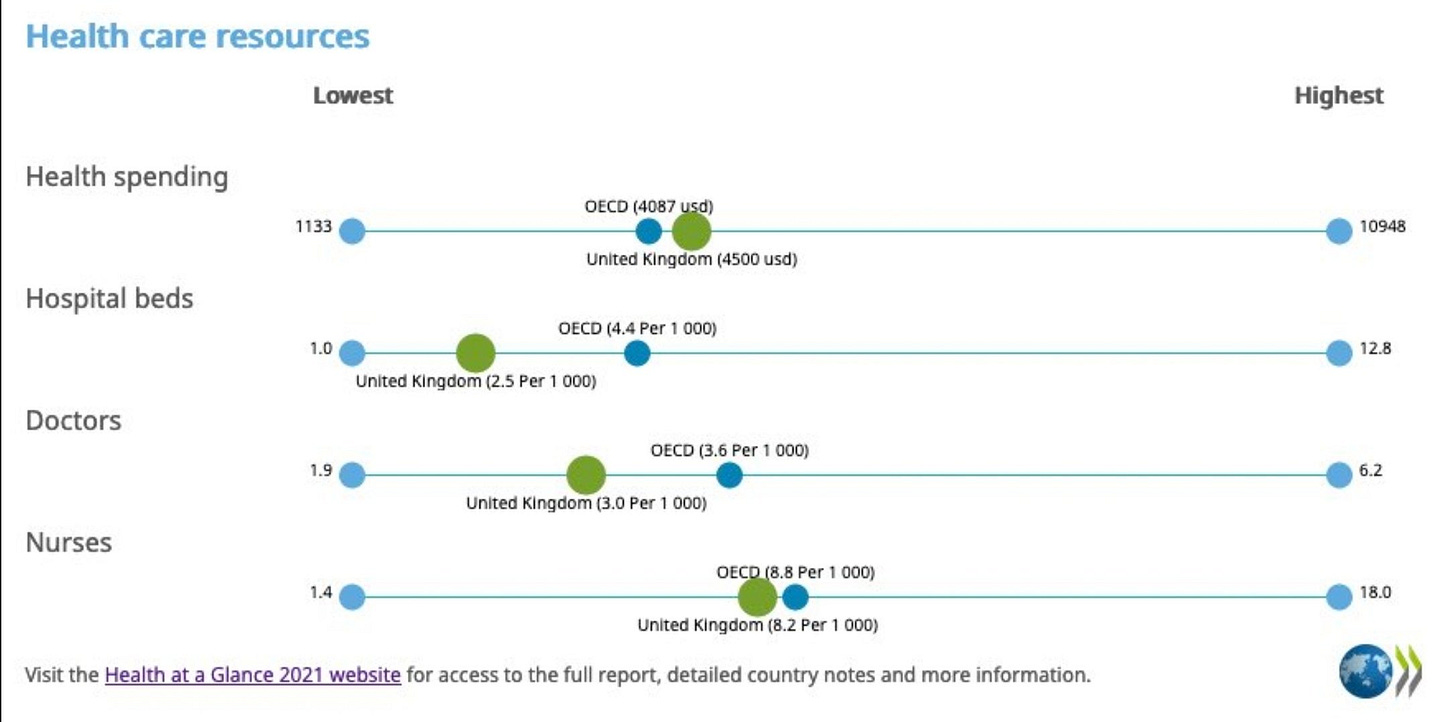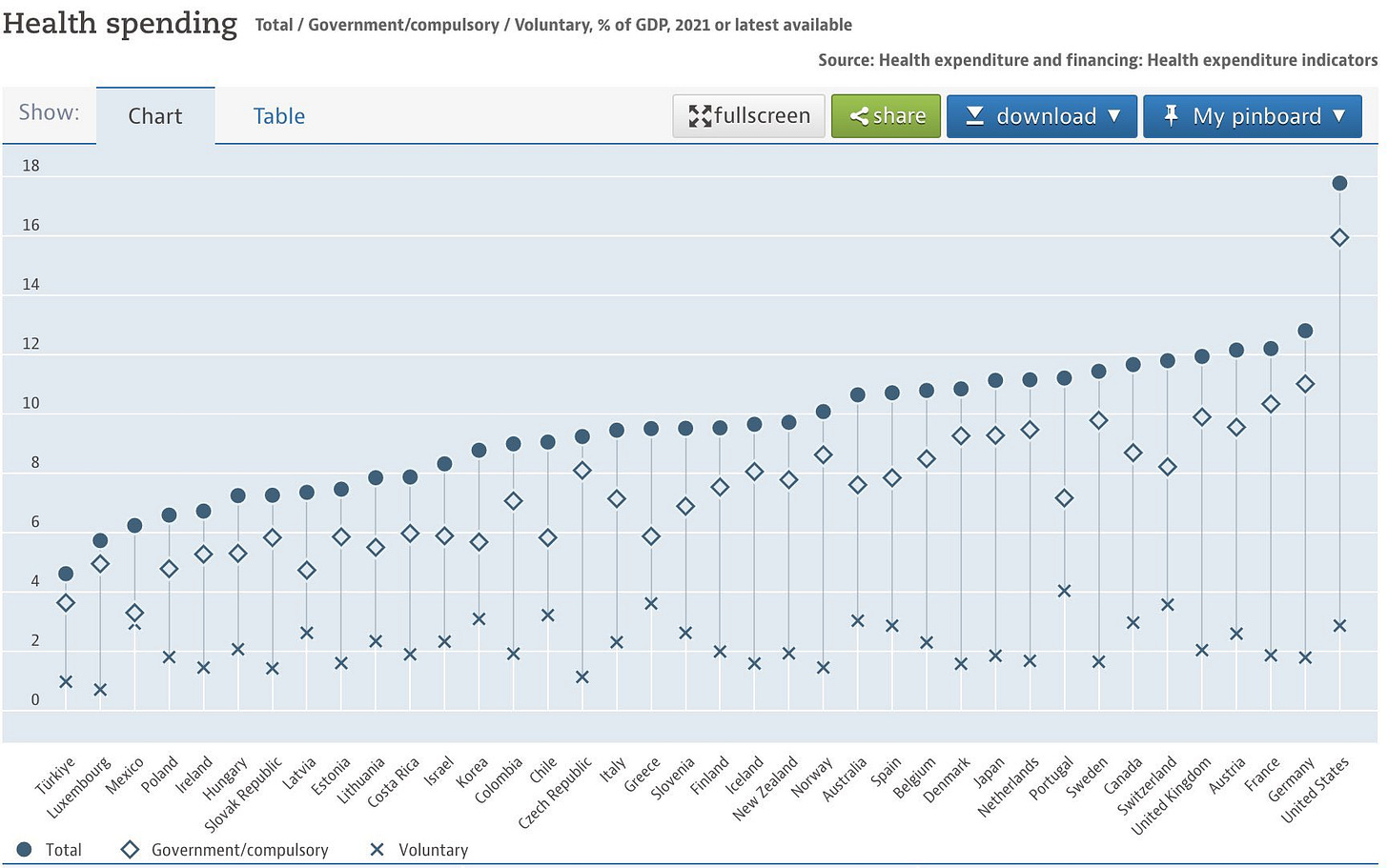The NHS cannot meet the needs of the people
If the government is the problem, get the government out of the way
I was at the Cambridge Union a couple of weeks ago proposing the motion ‘This House Believes the NHS Cannot Meet the Needs of the People’. You can watch my speech below and watch the whole thing here.
The motion was rejected by 182 votes to 78 and there were 63 abstentions. Not a bad result considering I was attacking the national religion. I’m told there was a swing in our favour.
My argument was that the NHS is manifestly not meeting the needs of the people and that it never will because it is an inefficient state monopoly lacking meaningful competition, price mechanisms and incentives to improve. I thanked the Union for holding the debate in mid-winter when the NHS’s shortcomings are most apparent. You will probably be familiar with the figures for A & E waits, hospital waiting lists, ambulance delays and excess deaths at the moment. The NHS is in crisis every winter and for much of the rest of the year too. This seems normal to us, but it is not normal for a healthcare system in a developed country.
The traditional response from defenders of the NHS is to bemoan under-funding and under-staffing. While this may be true in certain areas, it is not true overall. There are far too few doctors but there are plenty of employees.
And while there are far too few hospital beds, MRI scanners and CT machines, other countries manage to supply more of these with less money.
The DHSC budget has risen by nearly 50% in real terms since 2008/09. The policy of throwing money at it has been tested to destruction.
There are now very few countries that spend more on healthcare as a proportion of GDP. Rather than attempt to match the USA for spending, couldn’t we have a health system like Sweden or the Netherlands? Why don’t we emulate the Australians, Finns or Japanese, all of whom seem to get more bang for their buck?
I don’t suppose I will see meaningful reform of British healthcare in my lifetime. Many more people will have to die unnecessarily and many more trillions of pounds will have to be spent before we admit that the NHS model is fundamentally flawed.
The debate in Cambridge illustrated the stunted and parochial attitudes that make a sensible conversation about the healthcare in this country almost impossible. The NHS inspires jingoism in people who do not consider themselves to be nationalistic and makes Little Englanders of people who consider themselves European.
In debates like this, audience members can raise their hand to make a point of information. These can be useful if a speaker has made a factual error, but they often amount to little more than authorised heckles. So it was in Cambridge. The first person I gave way to blurted out a variant of the ‘who funds you?’ meme, but instead of asking that question simply asserted that the IEA is funded by private healthcare providers, which is news to me (I know of no such funding and would be fairly surprised if it existed).
The implication was that criticising the NHS was such a bizarre and improbable thing to do that anyone who does so must have dark, ulterior motives. A further implication was that the only people who would benefit from a patient-centred European approach to healthcare provision would be the providers. (Two of the opposition speakers, both doctors, have done well out of the NHS system but this was not commented on.)
The second person espoused her belief that the government is (a) planning to sell off the NHS, and (b) deliberately running down the NHS as part of this plan. This can only be described as a far-fetched conspiracy theory in that there is no evidence for it and the government has every incentive not to do it. The over-riding goal of political parties - especially the Conservative Party - is to get elected. The NHS is, depressingly, the most popular institution in the country. Selling it off would be political suicide. In any case, vastly increasing the amount spent on something is a funny way of running it down.
The third person brought up the USA. American healthcare features prominently in the rhetoric of NHS apologists because it is expensive and does not guarantee universal access. It has to be presented as the only alternative to a state-run leviathan because if people knew how healthcare systems work in the rest of the developed world, the NHS would lose its lustre.
I made it very clear that I neither admire nor seek to emulate the US model of healthcare, but that did not stop the first speaker for the opposition, Dr Martain Obedor, from claiming that I had praised it. Presumably he had written this in advance in the belief that this is the kind of thing a critic of the NHS would do, and then not listened to a word I said.
My colleague Kristian Niemietz, who does more of these debates than I do, has often observed that the British set the bar very low when it comes to judging the NHS. We will say things like “the NHS saved my life” or “the NHS cured my X” as if this were a miracle of medicine unknown to the benighted people of continental Europe who have to make do with a social insurance system. Some people even cite the fact that they were born in an NHS hospital as an argument-ending zinger.
There was quite a bit of this kind of stuff from the opposition. They had to persuade the audience that the NHS was the only way to provide universal healthcare free at the point of use, in the same way as a communist dictator might persuade his people that collective farms are the only way to ensure their families are fed.
They could not deny the fact that the NHS is failing to meet the needs of the people. Their argument was that it could meet the needs of the people if only the right government with the right policies was in charge. Who’s responsible for the chaos in A & E? The government! Who’s responsible for waiting lists rising to seven million? The government! Who was responsible for the Covid vaccine roll out? Er, well, that was a success so it was the NHS (may peace be upon it). But when things go wrong, it’s the government to blame.
I am quite prepared to believe that the NHS could work better under a different government. No doubt there are reforms that could be made within the existing state-run system that would improve it somewhat.
It would still not be able to meet the needs of the people, in my opinion, but let us take the opposition at their word and assume that the NHS would work as well as other healthcare systems if only Britain had a different (i.e. Labour) government.
Is this really a point in their favour? Surely it is a massive flaw in the system! In the most optimistic scenario, having a functioning NHS depends not only on giving it vast sums of money but also on always having the right political party in charge. This sounds like too much of gamble when so many people’s lives are at stake. The Conservative Party has been in power for most of the NHS’s history. According to the NHS’s most devoted admirers, the Tories are at best incapable of running the healthcare system properly and at worst are deliberately wrecking it. In practice, they are saying that they want a healthcare system that is, more often than not, run by incompetent and malign people!
The opposition would say that this is a misrepresentation of their position. They would say that what they are really arguing is that people should vote for the Good Party instead of the Bad Party and then everything would be alright. But the reality is that the Bad Party keeps getting elected, and even the Good Party isn’t guaranteed to do what the NHS’s disciples want it to do.
Wouldn’t it be better to have a healthcare system that does not depend on the whims of the electorate for it to provide an adequate service? Governments come and go. Voters have all sorts of concerns that have nothing to do with healthcare. If the government is the problem, wouldn’t it be better to get the government out of the way altogether rather than crossing your fingers and hoping for the right government?
There is a role for the state in ensuring that everyone has access to healthcare, but there is no reason for the state to be providing healthcare. Imagine living in a country where healthcare is barely a political issue at all. Wouldn’t it be wonderful? Imagine having general elections that are not dominated by furious, paranoid debates about the health service. Imagine living in a country where being successfully treated for a health problem in a timely and courteous way is taken for granted rather than being material for a lifelong anecdote.
You may say I’m a dreamer but I’m not quite the only one.






Great piece, but disheartening to know that so many cannot disentangle the disfunction of the current party in power from the irreparable disfunction of the NHS. Will a few years of Labour disabuse them of this leaning? I suspect not.
The funny thing is, I think both major parties privately know that big reforms are needed; but the Conservative Party is politically incapable of carrying out those reforms because so many voters are paranoid about their true intentions.
Well, by 2025 they won't be in power any more, and if the Labour Party is smart it will probably push through similar reforms, because it will actually be trusted on the issue to act in the public interest.